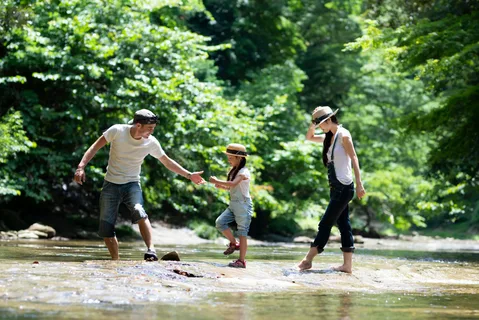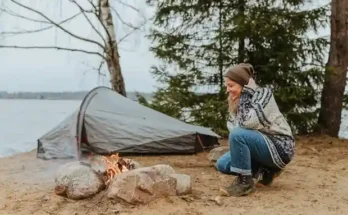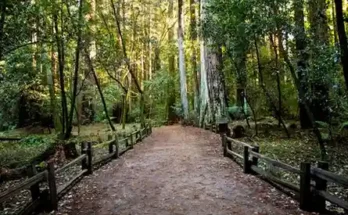There’s something ancient in our bones that stirs when we step outside. A primal thrill awakens when we feel the breeze on our skin, the crunch of gravel beneath our feet, and the vast sky stretching endlessly above us. It’s more than just fresh air—it’s freedom.
Modern life often boxes us in: walls, screens, routines. But the outdoors? It invites us to wander, to breathe deeper, to exist without edges. In a world obsessed with productivity, stepping outside can feel like rebellion—choosing presence over pressure, stillness over speed.
And yet, this rebellion heals. It doesn’t just change our surroundings. It changes us.
Nature as a Natural Medicine:
It turns out that spending time in nature isn’t just a poetic idea—it’s backed by science. Studies have shown that even a short walk in a green space can lower blood pressure, reduce cortisol (the stress hormone), and boost mood. Time outdoors activates the parasympathetic nervous system—the part of us that says, “Relax. You’re safe.” But nature’s gifts go beyond stress relief. Exposure to natural sunlight regulates our circadian rhythm, helping us sleep better. Being near trees and water can reduce symptoms of anxiety and depression. And even viewing images of natural landscapes can bring measurable calm.
Nature doesn’t ask us to fix ourselves. It simply invites us to remember who we are beneath the noise. We live in a world where our attention is pulled in a thousand directions. Notifications buzz, emails multiply, and the to-do list never ends. The outdoors offers a rare and precious alternative: silence. When we step into the wild—be it a forest, a beach, or just a quiet park—we disconnect from the digital and reconnect with the real. The world slows down. Our thoughts soften. And in that slowing, we find clarity that can’t be googled.
Unplugging outside isn’t escapism—it’s restoration. It reminds us that life isn’t always urgent, and neither are we.
Adventures That Awaken the Soul:
-
Walking, Wandering, and Wondering
You don’t have to climb Everest to experience the magic of outdoor adventure. Sometimes, the most profound moments come on a simple walk through a trail you’ve never noticed before.
Walking in nature is an ancient human rhythm. One foot, then the other. Breathing in sync with the earth. It’s meditative, grounding, and gently transformative. The path becomes a mirror, showing us what we’ve carried too long and what we’re ready to release.
Wandering, especially without a strict destination, invites wonder. You start to notice things: the way the sunlight filters through leaves, the intricate design of a spiderweb, the unexpected beauty of decay. Outdoors, the world becomes your teacher—and every step, a lesson.
-
The Rush of the Elements
Of course, the outdoors isn’t always gentle. Sometimes it’s raw, wild, and exhilarating. Rafting down a churning river, scaling a cliff face, running through a thunderstorm—these aren’t just adrenaline moments. They are reminders that we are alive.
When we challenge ourselves outside, we encounter the edges of our comfort zones. We learn to trust our bodies, face our fears, and dance with uncertainty. The elements don’t coddle us—they reveal us. And in those revelations, we often find our truest strength.
Outdoor Living:
-
Bringing the Outside In
Not everyone has the privilege of mountains in their backyard or national parks at their doorstep. But the outdoor mindset isn’t limited to epic scenery—it can be cultivated anywhere.
Grow herbs on a windowsill. Take your coffee on the porch instead of the couch. Open a window and let the breeze carry your thoughts. Rearrange your schedule so your daily walk becomes sacred time, not an afterthought.
You don’t need wilderness to touch the wild within. Sometimes, all it takes is choosing sky over screen.
-
Outdoor Rituals for Daily Life
The more we interact with the outdoors, the more we begin to ritualize it. A morning walk becomes a daily cleanse. Watching sunsets turns into a spiritual practice. Even sitting under a tree becomes an act of presence.
When we stop treating nature as an event and start seeing it as an extension of our living space, it begins to transform us. We slow down. We breathe differently. We begin to notice seasons not just in weather, but in ourselves.
The Importance of Outdoor Play:
-
Raising Wild and Free Kids
Children are natural explorers. Give them a stick, a rock, and some dirt, and they’ll build kingdoms. And yet, modern parenting often fences them in—physically and digitally. Screens replace streams. Playgrounds replace forests.
But outdoor play is essential. It boosts physical coordination, sparks creativity, and strengthens mental resilience. More importantly, it fosters a lifelong bond with nature. A child who climbs trees and chases butterflies is a child who learns to love and protect the earth.
Outdoor time isn’t just play—it’s growth. It teaches risk, confidence, and curiosity in ways no classroom can replicate.
-
Nature as the First Teacher
Before books and schools, humans learned from the land. The outdoors teaches patience through weather, humility through wildlife, and awe through every leaf and cloud.
For children, this education is priceless. Watching tadpoles grow, identifying bird songs, building forts from fallen branches—these are more than hobbies. They’re foundations of wisdom, empathy, and environmental stewardship.
In nature, every child becomes both a student and a storyteller.
Finding the Sacred in the Simple:
You don’t need a mat or mantra to meditate. Sit beside a river and listen. Walk barefoot through grass and feel. Gaze at the stars and wonder. Nature is a gateway to mindfulness because it demands nothing and offers everything. It doesn’t care how productive you are, how you look, or what you’ve achieved. It simply invites you to be. Being outside strips away the layers. It brings us back to the moment—to breath, to body, to being.
Many spiritual traditions have roots in nature. Monks meditated under trees. Prophets wandered deserts. Sacred mountains and healing springs fill mythologies around the world. Perhaps this is because the outdoors naturally connects us to something larger. It reminds us of our smallness, our interconnectedness, our place in the greater web. When we stand on a mountaintop or watch waves crash endlessly, we remember: we are part of something vast, mysterious, and beautiful.
In this sense, the outdoors becomes not just a place, but a temple.
Conclusion:
The outdoors isn’t just out there—it’s in us. It’s in our breath, our instincts, our longing for sunlight after days inside. To embrace the outdoors is not to escape life, but to return to it more fully.
Whether you’re hiking through ancient forests, watching a city sunrise, or simply sitting in the park with your eyes closed, remember: nature is always waiting. Not to impress you—but to welcome you back.
So step outside. Let the wind rearrange your thoughts. Let the birds rewrite your worries. Let the sky remind you that even in chaos, there is space. Even in stillness, there is life.
Because the wild isn’t just a place on the map. It’s a place in the heart.




